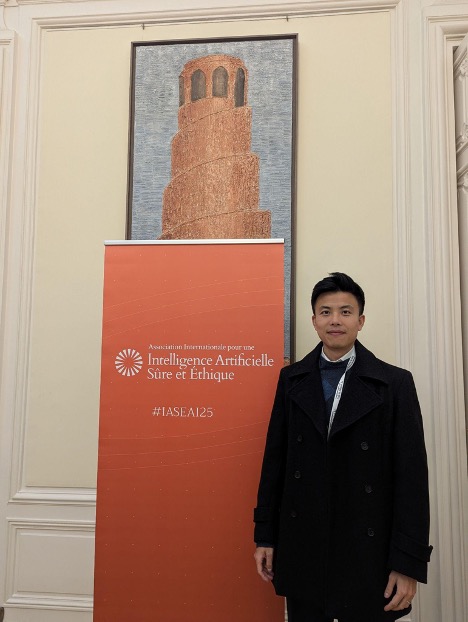As artificial intelligence becomes more ingrained in our economy and society, organizations like the International Association for Safe and Ethical AI (IASEAI) and the Institut Polytechnique de Paris (IP Paris) are convening global AI experts like Professor Peng Wei to secure a future in which AI is safe and ethical.
Professor Wei of the Mechanical and Aerospace Engineering (MAE) Department spoke at the IAESEAI Conference and the IP Paris’ AI, Science, and Society Conference in Paris at the start of February, ahead of the AI Action Summit.
Wei’s expertise in the intersection of AI and aviation safety comes in part from his NASA-funded research on guarding autonomous aircraft flying in high-density urban airspaces against cyberattacks. Prof. Wei, an affiliate researcher of the GW Trustworthy AI Initiative (TAI), has cemented himself as a critical voice in the global conversation surrounding safe and ethical AI.
The IASEAI is an independent organization committed to ensuring that advanced AI systems are guaranteed to operate safely and ethically, benefitting all of humanity. IASEAI strives to shape policy, promote research, and build understanding and community around ethical and safe AI.
At the IASEAI conference, Wei spoke on AI safety in aviation and avionics applications, addressing several lines of work in AI safety and certification from his research lab. The conference convened relevant stakeholders of safe and ethical AI, including leading experts from academia, civil society, industry, media, and government, to discuss the latest AI safety and ethics developments.
The IP Paris is a world-class education and research institute of science and technology that encompasses six prestigious French engineering schools. The AI, Science, and Society Conference was dedicated to exploring AI's transformative impact on science and society.
As a panelist at the AI, Science, and Society Conference, Wei emphasized that aviation is inherently risk-averse and safety-critical, necessitating a conservative and cautious approach to AI adoption. He acknowledged that the Federal Aviation Administration (FAA) has raised important questions regarding the safety and reliability of AI-driven tools. Wei emphasized that concern underscores the need for rigorous validation and certification processes.
Wei noted that both conferences were attended by esteemed AI experts, including Nobel Laureates, Turing Award winners, the French President's special envoy for the AI Action Summit, and experts from Meta and MIT. GW has emerged as a global leader in the conversation surrounding safe and ethical AI, and professors like Peng Wei drive the international, interdisciplinary dialogue alongside their esteemed peers.


